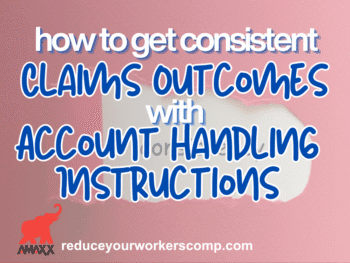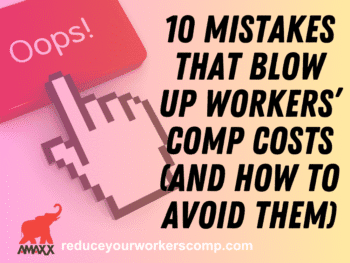Companies frequently miss the real causes of their high workers’ compensation costs. Until the real cost drivers are determined, any changes could just increase a company’s problems.
For example, one company thought they were being charged too much for nurse case management and were preparing to tell the third party administrator (TPA) to stop the service. However, the risk manager first toured their TPA’s claim facility, which gave her an appreciation for how well the claims were being handled. She saw that nurses were completely integrated into the claim handling operation. They were able to challenge compensability on questionable claims.
Good Housekeeping Is Good Business
Recently I was in the mailroom of a small branch of a large company that had all employees watch safety videos on proper lifting techniques and avoiding electrical hazards. However, the real issue was their housekeeping.
The state of the area was not only appallingly dirty; it also screamed “safety hazards!” The floor was slippery with dust. The plastic straps holding mail bundles together were cut and then flung around with abandon, many landing on the slippery floor. Packages were stacked haphazardly, often in the path of other workers. Sorted letters that fell to the floor were not immediately picked up. The hand-washing sink was black with newsprint and the soap dispenser was empty. There was no restroom facility in the building and the workers had to go to another building outside, in all kinds of weather. Garbage cans and recycling bins were full to overflowing. There was no place for employees to hang their coats because the lockers were blocked off with boxes of materials. Even the employee microwave and refrigerator were coated with dried food. Can you imagine all the possible employee injuries and illnesses this one place could generate?
Safety Managers
One company did not have a professional safety manager, which was a larger problem than their issue with the cost of nurse case management on individual claims. Not every company needs a full-time safety professional, but many do. An experienced safety professional can coordinate loss control support. They can develop safety plans, hold safety meetings and train workers on recognizing and avoiding safety hazards.
Safety Meetings and Equipment Checks
Mandatory safety meetings should be held at least monthly to review a specific topic. The agenda can include topics such as accident prevention, equipment maintenance, fatigue prevention, handling extreme heat or cold or what to do in a specific emergency situation such as fire, tornadoes or injuries.
Safety meetings should also be held every time a new project is begun or a new field location is scheduled. These meetings should cover any new equipment or procedures that will be used. Safety plans with new information about the nearest medical facilities and who to call in an emergency should be covered every time a project begins at a new site.
Equipment checks should be a priority to prevent accidents. Assign a supervisor to oversee equipment checks and maintenance and keep a log that this is done timely. Any parts not functioning correctly should be promptly replaced, especially where they could endanger a worker’s safety. Discourage the use of homemade fixes by unqualified employees trying to be helpful. Leave the repairs to professionals.
Author Michael B. Stack, CPA, Principal, Amaxx Risk Solutions, Inc. is an expert in employer communication systems and part of the Amaxx team helping companies reduce their workers compensation costs by 20% to 50%. He is a writer, speaker, and website publisher. www.reduceyourworkerscomp.com. Contact: mstack@reduceyourworkerscomp.com.
©2014 Amaxx Risk Solutions, Inc. All rights reserved under International Copyright Law.
WORK COMP CALCULATOR: http://www.LowerWC.com/calculator.php
MODIFIED DUTY CALCULATOR: http://www.LowerWC.com/transitional-duty-cost-calculator.php
WC GROUP: http://www.linkedin.com/groups?homeNewMember=&gid=1922050/
SUBSCRIBE: Workers Comp Resource Center Newsletter
Do not use this information without independent verification. All state laws vary. You should consult with your insurance broker, attorney, or qualified professional.
























